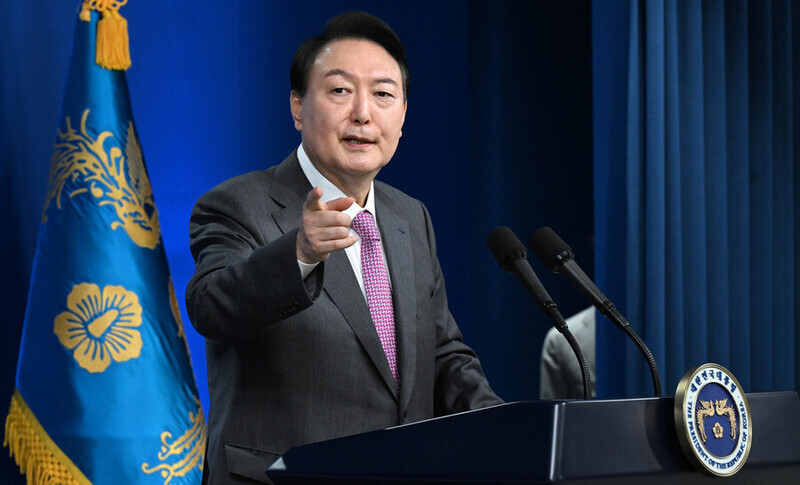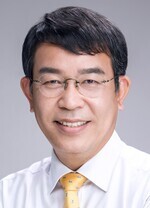hankyoreh
Links to other country sites 다른 나라 사이트 링크
[Guest essay] Can we really call Yoon’s plan for N. Korea “audacious”?


By Kim Jong-dae, visiting scholar at Yonsei Institute for North Korean Studies
President Yoon Suk-yeol’s plans for cooperation with North Korea, mentioned in his Liberation Day speech and the press conference marking his first 100 days in office, certainly have some positive aspects.
At his press conference on Wednesday, Yoon said that his “audacious initiative” includes diplomatic support for the normalization of relations between the US and North Korea and discussions on disarmament of conventional weapons systems.
Regarding denuclearization, Yoon said that his intention was not to make South Korean support conditional on North Korea’s up-front denuclearization. Instead, he said that, if North Korea shows its “intent” to denuclearize, then, South Korea could accordingly take reciprocal steps, including sanctions relief.
It was also refreshing to hear that the Yoon administration would “not be pursuing a forceful change to the status quo” in North Korea.
It is truly ironic to see Yoon, who had previously said that he could “annul” the 2018 inter-Korean military agreement signed under President Moon Jae-in, now make a 180-degree turn and try to pursue even greater successes than the former Moon government’s Panmunjom Declaration or the Pyongyang Joint Declaration.
However, despite this bold approach, when asked if he would be willing to engage in dialogue with North Korea, Yoon took a step back and said he didn’t want to put on a “political show” just for the sake of talks.
This stance comes from the wishful thinking that North Korea, still perceived by many as being a hungry and desperate nation, will eventually bow down and come to the negotiating table promising denuclearization.
Meanwhile, the plans to provide assistance in the forms of food and energy, as well as agricultural, infrastructure and financial assistance to North Korea were all included in the flash drive that former president Moon gave to the North Koreans in the past, as part of his “New Economic Initiative” for the Korean Peninsula.
North Korea is likely to recognize that there is nothing new in Yoon’s ideas.
Also, regarding the easing of sanctions, North Korea would be interested if South Korea showed some kind of will or plan to persuade the US and UN, but so far, the Yoon administration has failed to do so.
In fact, shortly after Yoon’s press conference, US State Department spokesman Ned Price reiterated Washington’s red line, saying that “unfortunately, [sanctions relief] is a complete hypothetical at this point.”
In addition, Voice of America quoted an unnamed UN Security Council official as saying that Yoon’s plan to provide unsanctioned goods such as food and medical equipment in exchange for North Korean minerals and rare earth elements “still violates sanctions.”
The ones who control the sanctions against North Korea are the UN and US, so who would believe that Yoon alone could ease these sanctions without their prior consent?
A similar trend is also visible when it comes to relations with China and Japan.
Regarding the additional deployment of the Terminal High Altitude Area Defense (THAAD) anti-missile system, although both the USFK and South Korean Ministry of National Defense both said there were “no plans” for additional deployments, Yoon had been calling for more deployments of THAAD ever since he was running for president. This led to a sovereignty dispute with China around the so-called “three noes and one restriction” policy regarding THAAD.
Although the security situation in South Korea remains exactly the same as before, the relationship between Seoul and Beijing has been damaged by a needless dispute. Is this all the result of Yoon being overly audacious?
Then there are the continuing issues with Japan. Without trying to find a solution to many historical issues still plaguing South Korea-Japan relations to this day, such as compensation for Koreans drafted into forced labor for Japan, Yoon has instead been calling for improving ties with Tokyo, calling Japan a “neighbor that pursues universal values.”
In June, the presidential office and the Ministry of Foreign Affairs announced that Japan would start dialogue with South Korea immediately after its local elections in July, but, as of August, nothing has changed. Therefore, it is difficult to ascertain the authenticity of this administration’s gauging of diplomatic situations.
Historically, there have been two main types of declarations made by South Korean presidents regarding inter-Korean relations. The first category includes the “Special Declaration for National Self-Esteem, Unification and Prosperity” by President Roh Tae-woo on July 7, 1988, the “Berlin Declaration” made in 2000 by President Kim Dae-jung, and the 2017 “New Berlin Declaration” made by Moon.
All of these declarations persuaded neighboring countries with consistent beliefs, philosophies and detailed plans for peace which led to bold implementation and, generally, success.
These declarations, which all brought about significant change during key turning points in international politics, can be evaluated as having been truly “audacious.” The basis for such declarations were long-term national strategies centered around discernment as well as the determination to take the lead in whatever situations may arise.
The other category of declarations, however, have been rather different. For example, President Park Geun-hye, who called unification a “jackpot” but failed to make any real headway, or President Lee Myung-bak’s “Vision 3000” strategy were all simply self-serving performances that lacked imagination or any real specific proposals.
Plans belonging to the latter category tend to go back and forth between a policy of appeasement and a policy of coercion against North Korea and Japan. This results in shallow policies based on no real convictions. It is important to remember how this kind of lack of conviction has hurt the Korean people in the past.
So, in what category does Yoon's “audacious initiative” belong?
If the answer is still unclear, maybe it would be best to give up the temptations of boldness or audacity and instead try taking a more objective look at the situation.
Please direct questions or comments to [english@hani.co.kr]

Editorial・opinion
![[Editorial] Does Yoon think the Korean public is wrong? [Editorial] Does Yoon think the Korean public is wrong?](https://flexible.img.hani.co.kr/flexible/normal/500/300/imgdb/original/2024/0417/8517133419684774.jpg) [Editorial] Does Yoon think the Korean public is wrong?
[Editorial] Does Yoon think the Korean public is wrong?![[Editorial] As it bolsters its alliance with US, Japan must be accountable for past [Editorial] As it bolsters its alliance with US, Japan must be accountable for past](https://flexible.img.hani.co.kr/flexible/normal/500/300/imgdb/original/2024/0417/6817133413968321.jpg) [Editorial] As it bolsters its alliance with US, Japan must be accountable for past
[Editorial] As it bolsters its alliance with US, Japan must be accountable for past- [Guest essay] Amending the Constitution is Yoon’s key to leaving office in public’s good graces
- [Editorial] 10 years on, lessons of Sewol tragedy must never be forgotten
- [Column] A death blow to Korea’s prosecutor politics
- [Correspondent’s column] The US and the end of Japanese pacifism
- [Guest essay] How Korea turned its trainee doctors into monsters
- [Guest essay] As someone who helped forge Seoul-Moscow ties, their status today troubles me
- [Editorial] Koreans sent a loud and clear message to Yoon
- [Column] In Korea’s midterm elections, it’s time for accountability
Most viewed articles
- 1‘Right direction’: After judgment day from voters, Yoon shrugs off calls for change
- 2[Editorial] Does Yoon think the Korean public is wrong?
- 3Strong dollar isn’t all that’s pushing won exchange rate into to 1,400 range
- 4Where Sewol sank 10 years ago, a sea of tears as parents mourn lost children
- 5Japan officially says compensation of Korean forced laborers isn’t its responsibility
- 6[Editorial] As it bolsters its alliance with US, Japan must be accountable for past
- 7[News analysis] Watershed augmentation of US-Japan alliance to put Korea’s diplomacy to the test
- 8Korea ranks among 10 countries going backward on coal power, report shows
- 9Faith in the power of memory: Why these teens carry yellow ribbons for Sewol
- 10[Guest essay] Amending the Constitution is Yoon’s key to leaving office in public’s good graces